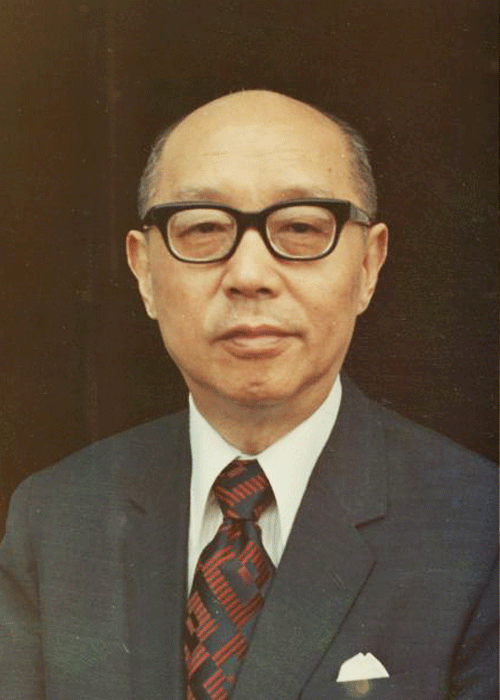Presidents since 1947
Yen Chia-kan
(5th term)
Term in office
1975.04.05 - 1978.05.20

| Years | Introduction |
|---|---|
| 1905 | Born in Suzhou, Jiangsu Province. Better known as C.K. Yen. |
| 1926 | Graduates from St. John's University in Shanghai. |
| 1939-08 | Serves as director of the finance department under the provincial government in Fujian. Initiates a policy allowing farmers in that province to pay land tax with their agricultural produce. This policy is later adopted nationwide and contributes considerably to the nation's food supplies during the Second World War for both the military and civilians. |
| 1950-01 | Appointed Minister of Economic Affairs. |
| 1950-03 | Transferred to the position of Minister of Finance. Implements a regulation on joint tax collections, maps out the nation's fiscal and monetary policies, and establishes a modern budgetary system. |
| 1954 | Appointed Governor of Taiwan Province and holds several concurrent positions, including commander of security, chairman of the cabinet's Economic Stabilization Board, and Minister of its Veterans Affairs Commission. |
| 1957-08 | Becomes Minister without Portfolio and serves concurrently as chairperson of the Council on US Aid and deputy chairperson of the Economic Stabilization Board. Formulates the nation's economic projects, allocates aid from the US, and stabilizes the nation's currency. |
| 1958-07 | Reappointed Finance Minister, and serves concurrently as a member of the Council on US Aid. Adopts policies to make Taiwan's business climate more favorable to investment and export trade. Under his leadership a 19-point project is implemented to speed Taiwan's economic growth. |
| 1963-12 to 1972-05 | Assumes office as Premier in December of 1963. While still Premier, is elected in May of 1966 as Vice President. Republic of China is hard hit by the termination of US aid and loses its United Nations membership, but still achieves the goals of its two four-year economic plans, which leads to a significant increase in investment and export trade. In 1970, Taiwan starts to enjoy a trade surplus, a high annual economic growth rate of 10.7 %, and a low inflation rate of 3.7%, outperforming many other countries in achieving the double goals of economic growth and price stability. Observers in the international community begin to speak of a “Taiwan economic miracle.” In addition, an export processing zone is established in December 1966 in order to stimulate Taiwan's economic growth and develop its export-oriented light industry. This pioneering undertaking successfully attracts investment from home and abroad, and greatly expands Taiwan's exports of industrial products. |
| 1972-05 | Elected to a second term as Vice President, resigns his concurrent position as Premier, and recommends then Vice Premier Chiang Ching-kuo as his successor. |
| 1975-04-05 | Sworn in as President upon the death of President Chiang Kai-shek. Integrates domestic political and economic resources and successfully oversees a smooth constitutional transfer of power. In the meantime, he strongly supports the plans of Premier Chiang Ching-kuo to push forward with the Ten Major Construction Projects, promote external trade, increase the gross national product, and set up incentive plans for the establishment of the capital- and technology-intensive Hsinchu Science-based Industrial Park. These measures enable Taiwan to become a model for other emerging industrial regions. |
| 1978-05-20 | Retires as President upon expiration of his term of office. |
| 1993-12-24 | Dies of illness. |
Personal timeline
Sworn in as President in accordance with Constitution upon death of President Chiang Kai-shek.
Announces intention to abide by the will of the late President Chiang, calls on nation to rally together in support of this policy.
Remarks in international press conference that the nation's future objectives will be adopted according to the late President Chiang's instructions, and that the government will follow Chiang's established policy, upgrade defense capabilities, and build up national strength.
Issues A Letter to Compatriots in Mainland China.
Presides over ceremonies marking the nation's founding anniversary and the new year and calls on his fellow countrymen to be prepared for a long and difficult struggle, not to let up, remain steadfast in their determination to reclaim the mainland, and overcome adversity to build a strong nation.
Presides over ceremonies marking 90th birthday anniversary of late President Chiang and the ground-breaking for Chiang Kai-shek Memorial Hall.
Visits Kingdom of Saudi Arabia.
In letter to KMT Secretary-General Chang Pao-shu, Yen proposes Chiang Ching-kuo, Premier of the Executive Yuan, as the party's presidential candidate.
KMT Central Standing Committee approves nomination of Premier Chiang Ching-kuo as the party's presidential candidate.
Premier Chiang Ching-kuo is elected President.
Steps down from the presidency.

